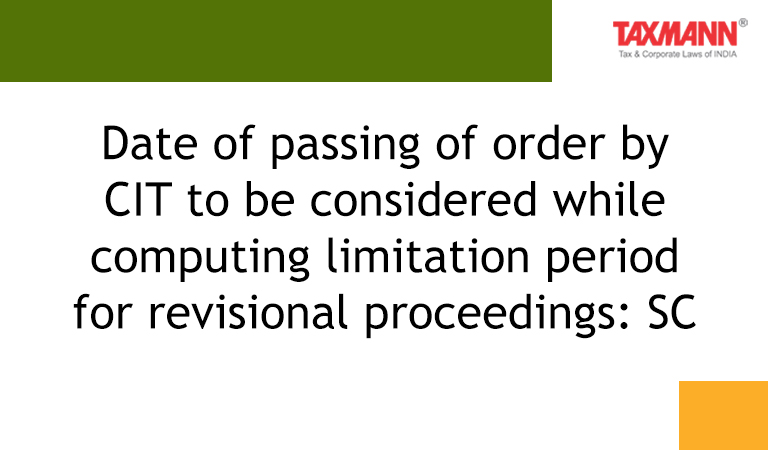Date of passing of order by CIT to be considered while computing limitation period for revisional proceedings: SC
- Blog|News|Income Tax|
- 2 Min Read
- By Taxmann
- |
- Last Updated on 13 October, 2021

Case Details: CIT v. Mohammed Meeran Shahul Hameed - [2021] 131 taxmann.com 94 (SC)
Judicial and Counsel Details
-
- M.R. Shah and A. S. Bopanna, JJ.
Facts of the Case
The issue before the Supreme Court was ‘Whether the High Court is right in holding that the relevant date for the purpose of considering the period of limitation under section 263(2) would be the date on which the order passed by the learned Commissioner is received by the assessee?’
Supreme Court Held
The Supreme Court held that on a fair reading of section 263(2), it could be seen that no order under section 263 shall be “made” after the expiry of two years from the end of the financial year in which the order sought to be revised was passed.
The word used is “made” and not the order “received” by the assessee. Even the word “dispatch” is not mentioned in section 263(2).
Thus, once it is established that the order under section 263 was made/passed within the period of two years from the end of the financial year in which the order sought to be revised was passed, such an order cannot be said to be beyond the period of limitation prescribed under section 263(2). Receipt of the order passed under section 263 by the assessee has no relevance for the purpose of counting the period of limitation provided under section 263.
As per the cardinal principle of law, the provision of the statute/act is to be read as it is and nothing is to be added or taken away from the provision of the statute. Therefore, the High Court has erred in holding that the order under section 263 passed by the learned Commissioner was barred by a period of limitation.
Disclaimer: The content/information published on the website is only for general information of the user and shall not be construed as legal advice. While the Taxmann has exercised reasonable efforts to ensure the veracity of information/content published, Taxmann shall be under no liability in any manner whatsoever for incorrect information, if any.

Taxmann Publications has a dedicated in-house Research & Editorial Team. This team consists of a team of Chartered Accountants, Company Secretaries, and Lawyers. This team works under the guidance and supervision of editor-in-chief Mr Rakesh Bhargava.
The Research and Editorial Team is responsible for developing reliable and accurate content for the readers. The team follows the six-sigma approach to achieve the benchmark of zero error in its publications and research platforms. The team ensures that the following publication guidelines are thoroughly followed while developing the content:
- The statutory material is obtained only from the authorized and reliable sources
- All the latest developments in the judicial and legislative fields are covered
- Prepare the analytical write-ups on current, controversial, and important issues to help the readers to understand the concept and its implications
- Every content published by Taxmann is complete, accurate and lucid
- All evidence-based statements are supported with proper reference to Section, Circular No., Notification No. or citations
- The golden rules of grammar, style and consistency are thoroughly followed
- Font and size that’s easy to read and remain consistent across all imprint and digital publications are applied



 CA | CS | CMA
CA | CS | CMA
